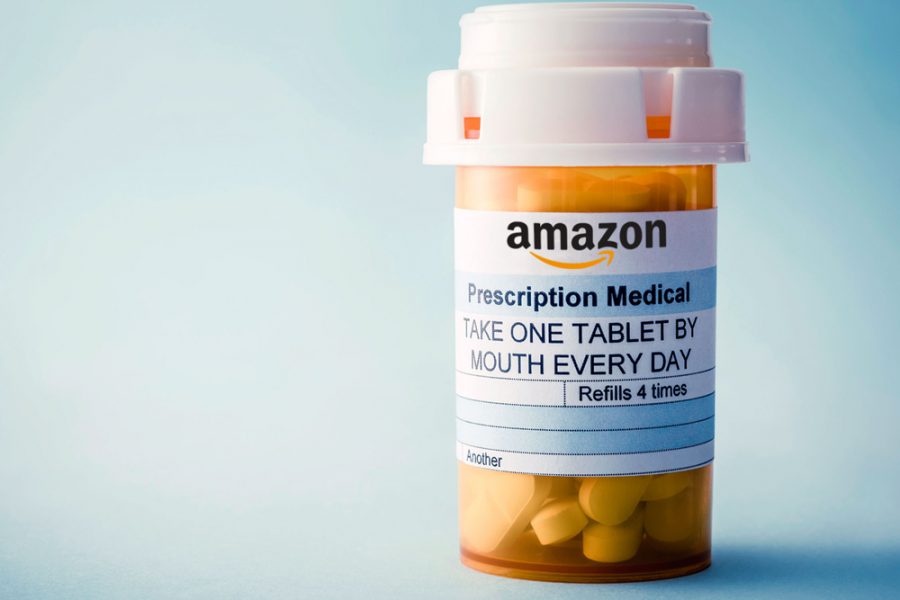Amazon dips toes in pharmaceuticals
Will they widen their ocean?
January 25, 2018
The biggest name in online shopping is none other than Amazon.com. From their amazing Alexa devices that compete with Google assistants to their Kindle Reader devices that compete with Barnes and Noble Nook Readers, the market giant with more than a $100 billion net worth is always ready for a new competitor to upstage.
After Amazon bought the Whole Foods for $13.7 billion on August 28 last year, they’ve created major price cuts on products and started offering more grocery items online. The rest of the market followed in their footsteps, with Costco starting a two-day online delivery service just over a month after the deal had been reached between Amazon and Whole Foods. However, Amazon has started to reach even further- into the waiting arms of the pharmaceutical industry.
Amazon has been quietly teaming up with Bartell Drugs, a small Seattle based pharmaceutical company, and has already introduced 90 percent of Bartell’s non-pharmaceutical products into the Amazon product line. Their involvement in the healthcare industry selling products like latex gloves and needles raises major questions in the minds of pharmacy giants.
CVS purchased the insurance company Aetna for $69 billion dollars to combat any movements by the Amazon company. However, unbeknownst to some of us, Amazon has bought multiple pharmaceutical licenses in 12 different states. Coupled with their purchase of Whole Foods, these added licenses have raised lots of eyebrows in the business world, questioning if Amazon is going to start selling prescription drugs. However, if it does happen, it won’t be anytime soon.
To be truly licensed to distribute pharmaceuticals in the United States, you have to be licensed Statewide and Nationally. One of the most important licenses is to become a Verified-Accredited Wholesale Distributor (a VAWD) which must come from the National Association of Boards of Pharmacy. Since Amazon hasn’t taken any steps we’re aware of yet to get this verification, it leads us to question their true intentions.
The dialogue becomes even more mixed with Amazon’s removal of their pharmaceutical supply license in Maine. Legally, you’re allowed to sell medical supplies and minor equipment in Maine without a license. This change makes it seem even more like Amazon isn’t planning on selling drugs, but just supplies.
Regardless of their current intentions, Amazon becoming a pharmaceutical toting company could very well bring a lot of great change to the United States business model for medicine. Amazon would have the opportunity to quickly mail drugs to the homes of consumers which would reduce the problems with picking up subscriptions. Especially during harsh winters like this one, it’s extremely important to make sure that people with weak immune systems or who could get seriously hurt while traveling in the frozen icy winter can receive their medicine safely.
Amazon also has the possibility to work around major insurance companies and reduce the middleman when it comes to healthcare. They could get a large distributor they can promote and feature to reduce prices for consumers, much like they did with Whole Foods, instead of making people resort to the inflated prices that insurance companies or retail stores like Walgreens can sometimes put on cheap pharmaceuticals. They can also create their own pharmaceutical company within Amazon. They are more than able to create a new business within their business, but it could spell trouble when it comes to the licenses needed and how many different drugs consumers may need. Such a big prospect is one of the most unlikely.
If Amazon does get into prescriptions, a delightful featured they would be sure to use would be to link the Alexa devices to the prescriptions. With just a simple voice command, diabetics could refill their insulin subscriptions, parents could refill Adderall prescriptions, and even your grandmother could refill her sleeping medication. The prospect of that system capability is enough to scare other pharmacies but make consumers excited for the news.
Even though nothing has been confirmed yet, Amazon becoming adding pharmaceuticals to the extensive list of products would have a lot of positive effects on consumers even if it may not have the best effect on other companies.



